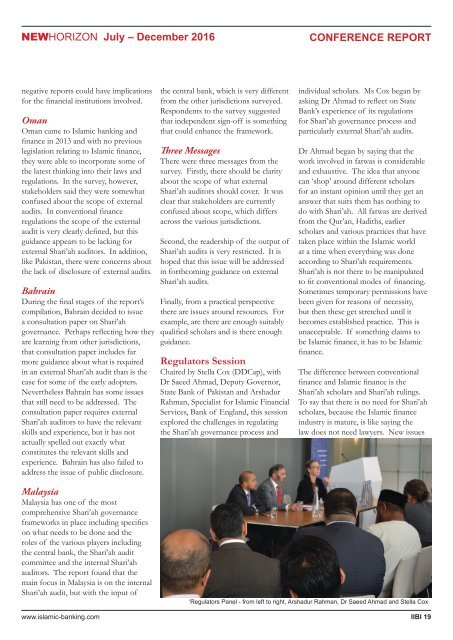NH-2016-q2
You also want an ePaper? Increase the reach of your titles
YUMPU automatically turns print PDFs into web optimized ePapers that Google loves.
NEWHORIZON July – December <strong>2016</strong><br />
CONFERENCE REPORT<br />
negative reports could have implications<br />
for the financial institutions involved.<br />
Oman<br />
Oman came to Islamic banking and<br />
finance in 2013 and with no previous<br />
legislation relating to Islamic finance,<br />
they were able to incorporate some of<br />
the latest thinking into their laws and<br />
regulations. In the survey, however,<br />
stakeholders said they were somewhat<br />
confused about the scope of external<br />
audits. In conventional finance<br />
regulations the scope of the external<br />
audit is very clearly defined, but this<br />
guidance appears to be lacking for<br />
external Shari’ah auditors. In addition,<br />
like Pakistan, there were concerns about<br />
the lack of disclosure of external audits.<br />
Bahrain<br />
During the final stages of the report’s<br />
compilation, Bahrain decided to issue<br />
a consultation paper on Shari’ah<br />
governance. Perhaps reflecting how they<br />
are learning from other jurisdictions,<br />
that consultation paper includes far<br />
more guidance about what is required<br />
in an external Shari’ah audit than is the<br />
case for some of the early adopters.<br />
Nevertheless Bahrain has some issues<br />
that still need to be addressed. The<br />
consultation paper requires external<br />
Shari’ah auditors to have the relevant<br />
skills and experience, but it has not<br />
actually spelled out exactly what<br />
constitutes the relevant skills and<br />
experience. Bahrain has also failed to<br />
address the issue of public disclosure.<br />
the central bank, which is very different<br />
from the other jurisdictions surveyed.<br />
Respondents to the survey suggested<br />
that independent sign-off is something<br />
that could enhance the framework.<br />
Three Messages<br />
There were three messages from the<br />
survey. Firstly, there should be clarity<br />
about the scope of what external<br />
Shari’ah auditors should cover. It was<br />
clear that stakeholders are currently<br />
confused about scope, which differs<br />
across the various jurisdictions.<br />
Second, the readership of the output of<br />
Shari’ah audits is very restricted. It is<br />
hoped that this issue will be addressed<br />
in forthcoming guidance on external<br />
Shari’ah audits.<br />
Finally, from a practical perspective<br />
there are issues around resources. For<br />
example, are there are enough suitably<br />
qualified scholars and is there enough<br />
guidance.<br />
Regulators Session<br />
Chaired by Stella Cox (DDCap), with<br />
Dr Saeed Ahmad, Deputy Governor,<br />
State Bank of Pakistan and Arshadur<br />
Rahman, Specialist for Islamic Financial<br />
Services, Bank of England, this session<br />
explored the challenges in regulating<br />
the Shari’ah governance process and<br />
individual scholars. Ms Cox began by<br />
asking Dr Ahmad to reflect on State<br />
Bank’s experience of its regulations<br />
for Shari’ah governance process and<br />
particularly external Shari’ah audits.<br />
Dr Ahmad began by saying that the<br />
work involved in fatwas is considerable<br />
and exhaustive. The idea that anyone<br />
can ‘shop’ around different scholars<br />
for an instant opinion until they get an<br />
answer that suits them has nothing to<br />
do with Shari’ah. All fatwas are derived<br />
from the Qur’an, Hadiths, earlier<br />
scholars and various practices that have<br />
taken place within the Islamic world<br />
at a time when everything was done<br />
according to Shari’ah requirements.<br />
Shari’ah is not there to be manipulated<br />
to fit conventional modes of financing.<br />
Sometimes temporary permissions have<br />
been given for reasons of necessity,<br />
but then these get stretched until it<br />
becomes established practice. This is<br />
unacceptable. If something claims to<br />
be Islamic finance, it has to be Islamic<br />
finance.<br />
The difference between conventional<br />
finance and Islamic finance is the<br />
Shari’ah scholars and Shari’ah rulings.<br />
To say that there is no need for Shari’ah<br />
scholars, because the Islamic finance<br />
industry is mature, is like saying the<br />
law does not need lawyers. New issues<br />
Malaysia<br />
Malaysia has one of the most<br />
comprehensive Shari’ah governance<br />
frameworks in place including specifics<br />
on what needs to be done and the<br />
roles of the various players including<br />
the central bank, the Shari’ah audit<br />
committee and the internal Shari’ah<br />
auditors. The report found that the<br />
main focus in Malaysia is on the internal<br />
Shari’ah audit, but with the input of<br />
‘Regulators Panel - from left to right, Arshadur Rahman, Dr Saeed Ahmad and Stella Cox<br />
www.islamic-banking.com IIBI 19


